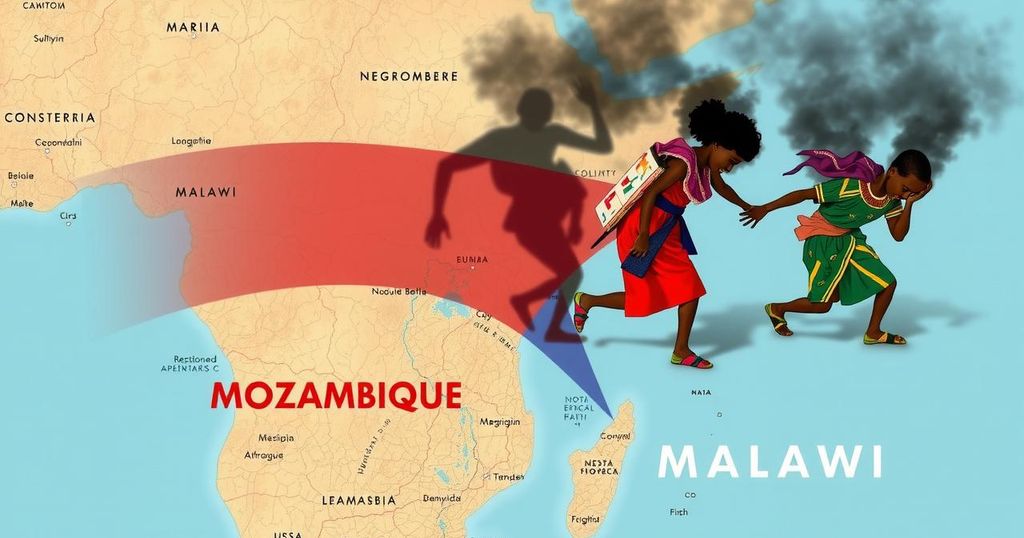Mass Exodus from Mozambique to Malawi Amid Post-Election Violence

Post-election chaos in Mozambique has resulted in a mass exodus of thousands to Malawi, with over 13,000 refugees currently in makeshift camps. The violence, stemming from a disputed election outcome, has led to widespread destruction of homes and deep personal traumas for those fleeing. Humanitarian efforts are being mobilized, yet many basic needs remain unmet as the situation continues to develop.
Following the recent disputed elections in Mozambique, there has been a significant exodus of thousands of citizens fleeing to Malawi due to escalating post-election violence. This unrest has resulted in homes being destroyed and lives disrupted, with families seeking refuge in makeshift camps. These camps, primarily located in the Nsanje district of southern Malawi, house over 13,000 individuals, including children, who have been uprooted from their homes amid the chaos. Many of these refugees recount traumatic experiences, reflecting on their survival during the conflict and the harrowing circumstances under which they left Mozambique.
Among those affected is a 25-year-old woman, referred to as Esther, who recounted her harrowing experience of witnessing her home being set ablaze by unidentified assailants. “I immediately dropped the bucket and fled into the bush, where I joined my neighbors,” she stated, reflecting the urgency and fear that drove her to escape. As of late December, the violence following the October elections has resulted in approximately 2,500 families seeking refuge in Malawi. This turmoil escalated after the Constitutional Council upheld the ruling party’s election victory, igniting further unrest and clashes between opposing factions.
As refugees arrive, local authorities and humanitarian organizations are mobilizing to provide assistance, including food and shelter. However, many still struggle with basic needs. A young refugee named José shared his plight, indicating they are reliant on the generosity of others for clothing and sustenance. “We do not have food and are surviving on water. We need clothes, household items, and somewhere to sleep like normal people. Mozambique is my home. If peace returns, we will go back, but what we saw terrified us. I have never seen anything like it. Our hope is for peace, but the fear remains,” he expressed.
Amid this crisis, the Malawian government, alongside organizations like the United Nations High Commission for Refugees, is working to formalize aid efforts for these displaced individuals. They are registering the refugees and establishing a more structured response to this emerging humanitarian crisis, as the international community watches the situation with concern.
The post-election violence in Mozambique escalated following the contentious elections held on October 11, when the ruling Front for the Liberation of Mozambique (Frelimo) declared victory, allegedly amid claims of election fraud by opposition parties. These events have fueled a wave of violence, leading to significant loss of life and widespread destruction in the country. The ongoing conflict has raised concerns about stability in the region, prompting thousands of Mozambicans to flee to neighboring Malawi in search of safety and humanitarian assistance. Current efforts by the Malawian government and UN agencies aim to manage the influx of refugees and establish necessary support systems.
In conclusion, the aftermath of Mozambique’s disputed elections has led to widespread displacement as citizens flee violence and chaos, seeking refuge in Malawi. The humanitarian crisis is marked by urgent needs for food, clothing, and shelter, as many individuals recount traumatic experiences that forced them from their homes. Efforts by the Malawian government and humanitarian organizations are underway to register and assist these refugees, highlighting the pressing need for peace and stability in Mozambique, as the situation continues to evolve.
Original Source: www.rfi.fr







